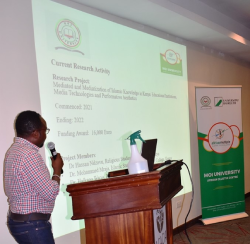
Prof. Hassan J. Ndzovu., Spokesperson and Principal Investigator- Research Section Learning
About RS Learning
This RS seeks to realize an understanding of multiple and interrelated processes of learning in Africa and their connectedness beyond the continent, with particular reference to—and relevance for—the cluster’s key concepts of multiplicity and relationality. Our different but nonetheless related disciplinary perspectives will contribute to a joint understanding of the many roles that learning plays in the making of subjectivities, life-stages and gendered bodies, and the ways that these are framed through the unequal distribution of educational opportunities. We will also seek to analyse how learning itself is relationally constituted by —and at least partly co-constitutes — institutions, worldviews, communications, infrastructures, and transnational and transcontinental connections. Our understanding of learning goes beyond research approaches that limit their focus to formal educational settings such as schools or universities. Rather, we will address learning in a wider sense, encompassing all of the ways and processes in which knowledge and skills are transmitted, acquired and (re-)produced, regardless of institutional borders. We include private homes, schools, markets, media, streets, farms and international organisations in our considerations. We are interested in multiple learning processes and their inherent temporalities: in learning by doing; as a bodily practice; as a form of appropriation or mimesis, and as a mode of communication. Blurring the boundaries between artificial dichotomies such as formal / informal, institutional / non-institutional, modern / traditional, literate / illiterate, we will direct our interest to the interplay between various learning spaces and media. This relational perspective on learning processes in Africa and elsewhere will allow us to highlight their multiplicity and to analyse their entanglements, mutual coexistence, conditions of emergence, and the multiple ways in which learning processes combine in peoples’ lives. In order to get a sense of the manifold interrelations within the highly heterogeneous African educational landscape, we see a particular need for studying learners as embedded in their specific environments, and at the same time as producers of these environments through their networks of relations.
Mission
This RS seeks to realize an understanding of multiple and interrelated processes of learning in Africa and their connectedness beyond the continent, with particular reference to—and relevance for—the cluster’s key concepts of multiplicity and relationality.
RS Learning
Principal Investigators, Moi African Cluster Centre (Moi-ACC):
1. Prof. Hassan Ndzovu, Islamic Studies, Spokesperson
2. Prof. Mosol Kandagor, Kiwahili Linguistics
3. Dr. Billian Otundo, English Linguistics
4. Dr. Simon Omare, Religious Studies
5. Dr. Jane Mwonga, Musicology
6. Mr. Collins Mumbo, Kiswahili Linguistics
7. Mr Wilberforce Kutol, English Linguistics
8. Mr Kennedy Zalo, French Linguistics
This RS seeks to realize an understanding of multiple and interrelated processes of learning in Africa and their connectedness beyond the continent, with particular reference to—and relevance for—the cluster’s key concepts of multiplicity and relationality. Our different but nonetheless related disciplinary perspectives will contribute to a joint understanding of the many roles that learning plays in the making of subjectivities, life-stages and gendered bodies, and the ways that these are framed through the unequal distribution of educational opportunities. We will also seek to analyse how learning itself is relationally constituted by —and at least partly co-constitutes — institutions, worldviews, communications, infrastructures, and transnational and transcontinental connections. Our understanding of learning goes beyond research approaches that limit their focus to formal educational settings such as schools or universities. Rather, we will address learning in a wider sense, encompassing all of the ways and processes in which knowledge and skills are transmitted, acquired and (re-)produced, regardless of institutional borders. We include private homes, schools, markets, media, streets, farms and international organisations in our considerations. We are interested in multiple learning processes and their inherent temporalities: in learning by doing; as a bodily practice; as a form of appropriation or mimesis, and as a mode of communication. Blurring the boundaries between artificial dichotomies such as formal / informal, institutional / non-institutional, modern / traditional, literate / illiterate, we will direct our interest to the interplay between various learning spaces and media. This relational perspective on learning processes in Africa and elsewhere will allow us to highlight their multiplicity and to analyse their entanglements, mutual coexistence, conditions of emergence, and the multiple ways in which learning processes combine in peoples’ lives. In order to get a sense of the manifold interrelations within the highly heterogeneous African educational landscape, we see a particular need for studying learners as embedded in their specific environments, and at the same time as producers of these environments through their networks of relations.
Mission
This RS seeks to realize an understanding of multiple and interrelated processes of learning in Africa and their connectedness beyond the continent, with particular reference to—and relevance for—the cluster’s key concepts of multiplicity and relationality.
RS Learning
Principal Investigators, Moi African Cluster Centre (Moi-ACC):
1. Prof. Hassan Ndzovu, Islamic Studies, Spokesperson
2. Prof. Mosol Kandagor, Kiwahili Linguistics
3. Dr. Billian Otundo, English Linguistics
4. Dr. Simon Omare, Religious Studies
5. Dr. Jane Mwonga, Musicology
6. Mr. Collins Mumbo, Kiswahili Linguistics
7. Mr Wilberforce Kutol, English Linguistics
8. Mr Kennedy Zalo, French Linguistics
